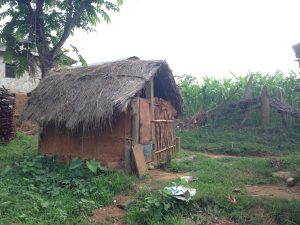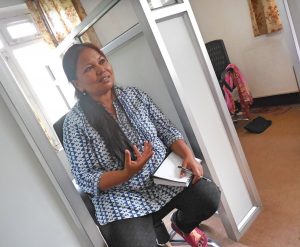Aruna has patience that almost seems defined by her determination. Perhaps this is a useful (if somewhat unlikely) combination of traits for anyone with her job—an Advocacy and Training Officer working on the reproductive rights campaigns of the Centre for Agro-Ecology and Development (CAED) in Nepal.
CAED Office, Kathmandu
She explains the origins of chhaupadi, a practice of banishing women to a chhau goth (hut) during their menstrual period that persists in western Nepal. More information on this will follow in later blog posts, but for the benefit of readers who are unfamiliar with the practice, it is founded on a belief prevailing in certain Hindu cultures that women are impure during this time and after childbirth. Chhaupadi roughly translates as “the condition of being untouchable during menstruation”.

Chhau goth
In addition to their banishment from the family home, Aruna explains, women and girls are forbidden from touching household items and other people (except infants); engaging in social and family events; consuming any dairy, meat, vegetables or fruit; and bathing. She is joined by Kulyani, who helps with translating and adds to Aruna’s descriptions. Another CAED staff member stops by to listen to our discussion.
Aruna attributes the spread of chhaupadhi to a restrictive religious interpretation propagated by gurus and other spiritual leaders a few centuries back (for example, in the Garud Puran and Manusmriti). We all marvel at the contrast with older Hindu texts, which do not mention menstrual impurity.

Aruna, Field Officer with CAED
“The most difficult part of putting an end to this practice is the mindset”, Aruna says. A few years ago, she was in a village called Murma in far western Nepal, raising awareness about the dangers of chhaupadi (including rape, illness and death). She managed to convince 75 households to allow their women to sleep on the verandahs outside their houses, where they could be closer to their family and away from the dark and damp confines of the chhau goth. Aruna was happy with this first step. 10 women even began sleeping indoors.

The dangers of chhaupadi reported in a local newspaper
These 10 success stories have probably been short-lived. On the last day of the training program, one of the girls in the village began menstruating for the first time and her family agreed to let her sleep inside, to Aruna’s delight. She woke with a crick in her neck, which almost all villagers took to be an irrefutable reminder of the punishment that will be dealt to all those who fail to practice chhaupadhi. I’m afraid to ask whether the group of 10 women returned to the chhau goth, and suddenly understand why determination needs to be coupled with patience in this line of work.
Posted By Caroline Armstrong Hall (Nepal)
Posted Jun 23rd, 2018



8 Comments
Ali West
June 25, 2018
Patience and determination definitely seem to be important characteristics when dealing with this tradition that is so engrained in Nepali culture. I think that you will do great work with CAED. We are supporting you from DC!
Samantha Givens
June 25, 2018
Thank you so much for sharing this, I was not aware that they could not consume any dairy, meat, vegetables or fruit. Please keep sharing, it’s incredibly important to know all of this. Keep it up, we support you over here in DC.
Corinne Cummings
June 25, 2018
Hey Caroline. First, nice to meet you over your first blog post, my name is Corinne, I am one of AP’s new interns for the summer. I enjoyed reading your words and observations on this matter at hand, chhaupadi. I read a New York Times article that discussed this issue; you revealed more information in your blog posting. The article did not mention the menstruating women’s diet or the fact they could touch infants. These facts are interesting to learn. I hope substantial change can be brought about in Western Nepal. It appears this superstition is really ingrained in their society–to the point where the women often feel pressured by their elders to adhere to this method of handling their menstruation. I learned this practice has occurred for over a hundred years. That is a long time; hopefully, more persuasion will change the minds of those that still hold onto this old belief. I wish you luck as you continue your journey of positive development in Western Nepal. Take care, Caroline. Best wishes, Corinne
Jamilla
June 28, 2018
Caroline thank you very much for sharing this with us. I heard about this practice and I am extremely happy to learn more from you on this practice. Keep it up and all the best wishes for your research!
Princia Vas
July 2, 2018
Your blog was a wonderful read and thank you for sharing the inspiring story of Aruna and the work she is doing. We are certain that you will do a great job in your work with CAED! Looking forward to reading more of your posts:)
Donna Olson
July 10, 2018
Thank you for sharing this story and CAED’s work! I am interested in learning what the women eat during this time. Or are they required to fast?
Caroline Armstrong Hall (Nepal)
July 11, 2018
Thanks for your comment, Donna! The practices in relation to food that my colleagues from CAED and I encountered on a recent visit to western Nepal differed depending on which village the girls are from. In some villages, women and girls are not allowed to consume any animal products, fruits, vegetables or pickle (preserves) while they have their period. In other villages, they reported being allowed to eat whatever they like (although often they will have to eat from separate plates).
iain
July 13, 2018
Extremely interesting and informative first blog although I’m surprised to read that Aruna puts the blame on religion. And WHY the taboo on milk products??? Is there any nutritional justification for this? Look forward to getting to know some of these women and girls and learning how you’d go about proposing change.